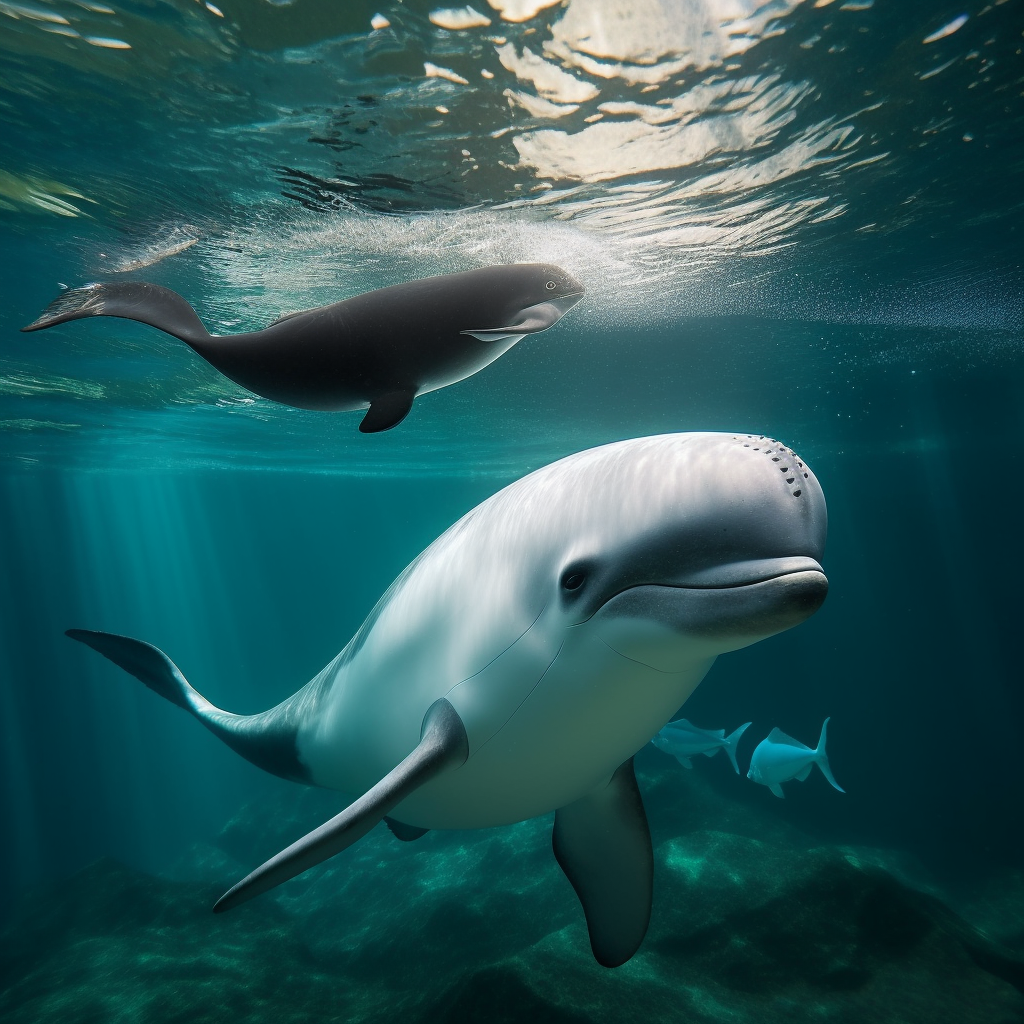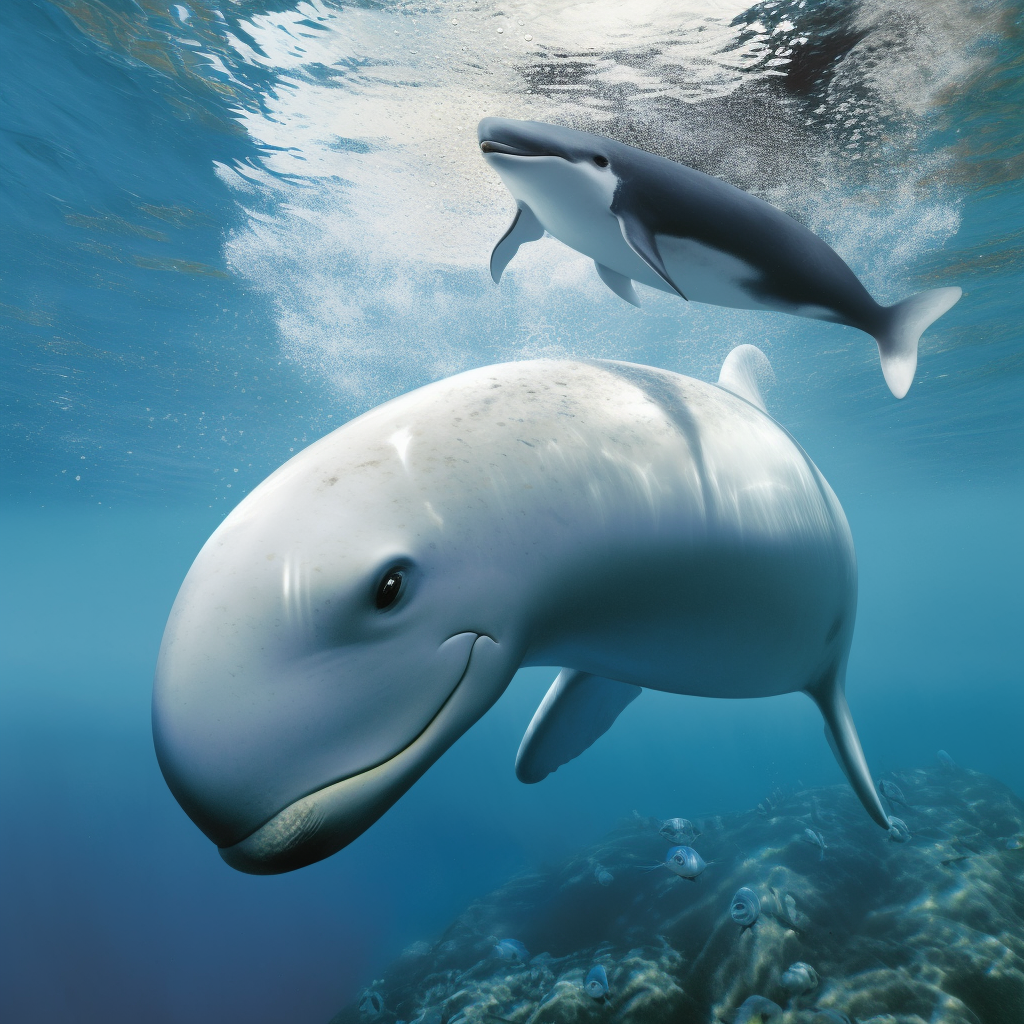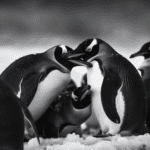Beluga whales and penguins are both fascinating creatures that inhabit different parts of the world. Belugas, also known as white whales, are found in the Arctic and sub-Arctic regions, while penguins are primarily found in the Southern Hemisphere, particularly in Antarctica. These two species have distinct characteristics and lifestyles, which leads to the question: do beluga whales eat penguins? In this article, we will explore the feeding habits of beluga whales and whether they include penguins in their diet. We will delve into the natural habitats of these animals, their preferred prey, and shed light on the interactions between belugas and penguins. So, let’s dive in and uncover the truth behind this intriguing question.
Key Takeaways
- Beluga whales do not eat penguins.
- Beluga whales are primarily carnivorous and their diet consists of fish, squid, and crustaceans.
- Penguins are not found in the natural habitat of beluga whales, which is primarily in Arctic and sub-Arctic regions.
- While beluga whales and penguins may coexist in some marine parks or zoos, they are not natural prey for beluga whales in the wild.
Understanding Beluga Whales: An Overview

Beluga whales, also known as “sea canaries” due to their melodic vocalizations, are fascinating creatures that inhabit the Arctic and sub-Arctic regions. In this section, we will explore the unique characteristics of beluga whales and their natural habitat.
A. The Unique Characteristics of Beluga Whales
Beluga whales are easily recognizable due to their distinctive appearance. Here are some key characteristics that set them apart:
-
Size and Color: Belugas are medium-sized whales, measuring between 13 to 20 feet in length. They have a robust body covered in a thick layer of blubber, which helps them survive in icy waters. One of the most striking features of belugas is their pure white or light gray color, which distinguishes them from other whale species.
-
Melon and Forehead: Belugas have a prominent forehead, known as a “melon,” which allows them to produce a variety of vocalizations. This melon acts as an acoustic lens, helping them communicate with other members of their pod. These vocalizations play a crucial role in their social interactions and navigation.
-
Flexible Neck: Unlike most other whale species, belugas have a flexible neck that enables them to move their heads in various directions. This flexibility allows them to maneuver efficiently in their aquatic environment, making them agile swimmers.
-
Dental Adaptations: Belugas possess a set of conical teeth that are adapted for catching and consuming their prey. These teeth are not used for chewing, as belugas primarily swallow their food whole. Their diet mainly consists of fish, squid, and crustaceans.
-
Social Behavior: Belugas are highly social animals and typically live in pods ranging from a few individuals to several hundred. These pods are often composed of related individuals and exhibit complex social structures. Belugas are known for their playful behavior, frequently engaging in activities such as breaching, spyhopping, and tail-slapping.
B. The Natural Habitat of Beluga Whales
Beluga whales are primarily found in the Arctic and sub-Arctic regions, inhabiting coastal areas and estuaries. Here are some key aspects of their natural habitat:
-
Arctic Waters: Belugas are well-adapted to survive in the extreme conditions of the Arctic. They are specially equipped to withstand the freezing temperatures and navigate through the icy waters. Their thick layer of blubber provides insulation, while their streamlined bodies allow them to swim efficiently.
-
Migration Patterns: Belugas are known for their extensive migration patterns. During the summer months, they move towards the northern regions, where they take advantage of the abundant food sources. As winter approaches, they migrate southward to areas with less ice cover, seeking warmer waters and access to breathing holes.
-
Coastal Areas and Estuaries: Belugas prefer shallow coastal areas and estuaries, where they can find a diverse range of prey. These areas also offer protection from predators and serve as important calving grounds. Belugas are known to venture into rivers and even travel hundreds of miles inland, adapting to the changing tides and water levels.
-
Interaction with Other Species: Beluga whales are part of a complex marine ecosystem, interacting with various other species. They share their habitat with animals such as seals, walruses, polar bears, and a variety of fish species. These interactions play a crucial role in maintaining the delicate balance of the Arctic food chain.
Understanding the unique characteristics of beluga whales and their natural habitat is essential for appreciating their role in the Arctic marine ecosystem. In the following sections, we will delve deeper into their hunting habits, behavior, and the impact they have on the penguin population in the Arctic.
The Diet of Beluga Whales

Beluga whales, also known as “sea canaries” due to their melodic vocalizations, are fascinating creatures that inhabit the Arctic and sub-Arctic regions. These majestic marine mammals have a diverse diet that consists of various food sources, allowing them to adapt to their unique environment. Let’s explore the typical food sources for beluga whales and how they hunt and gather their food.
A. Typical Food Sources for Beluga Whales
Beluga whales are opportunistic feeders, meaning they will consume whatever food is available to them in their habitat. Their diet primarily consists of fish, but they are known to consume a wide range of marine organisms. Some of the typical food sources for beluga whales include:
-
Fish: Fish make up a significant portion of the beluga whale’s diet. They feed on various species, including Arctic cod, capelin, herring, and smelt. These fish provide the belugas with essential nutrients and energy.
-
Squid and Octopus: Beluga whales also consume squid and octopus when they come across them in their habitat. These cephalopods offer a different texture and taste to their diet, adding variety to their meals.
-
Crustaceans: Crustaceans, such as shrimp and crabs, are another food source for beluga whales. These small marine creatures provide a source of protein and are often found in abundance in the Arctic waters.
-
Amphipods: Beluga whales also feed on amphipods, which are small shrimp-like crustaceans. These tiny organisms are an important part of the beluga whale’s diet, especially during certain times of the year when they are plentiful.
-
Marine Worms: In addition to fish and crustaceans, beluga whales also consume marine worms. These worms are found in the sediment at the bottom of the ocean and provide an additional source of nutrition for the whales.
B. How Beluga Whales Hunt and Gather Their Food
Beluga whales employ various hunting strategies to gather their food. They have adapted to their Arctic environment and developed unique hunting habits to survive. Here are some ways beluga whales hunt and gather their food:
-
Echolocation: Beluga whales use echolocation to locate their prey. They emit high-frequency sounds and listen for the echoes that bounce back. This allows them to detect fish and other organisms even in dark or murky waters.
-
Cooperative Hunting: Beluga whales often engage in cooperative hunting. They work together in groups, known as pods, to corral and capture schools of fish. By using their numbers, they can effectively surround their prey and make it easier to catch.
-
Bubble Net Feeding: Another hunting technique employed by beluga whales is bubble net feeding. This behavior involves a group of whales blowing bubbles in a circular pattern around a school of fish, creating a “net” of bubbles. The whales then swim upwards through the center of the bubble net, forcing the fish to concentrate in a tight ball, making it easier to catch them.
-
Diving and Lunging: Beluga whales are skilled divers and can dive to great depths in search of food. They can hold their breath for extended periods, allowing them to pursue prey underwater. Once they locate their target, they lunge forward with their mouths open, engulfing their prey in a swift motion.
Beluga whales have evolved to be efficient hunters, utilizing their unique characteristics and behaviors to secure their meals in the challenging Arctic environment. Their diverse diet and hunting strategies contribute to the delicate balance of the marine ecosystem in which they reside.
In the next section, we will explore the interaction between beluga whales and penguins, shedding light on whether beluga whales eat these flightless birds or not. Stay tuned to uncover the fascinating dynamics between these two Arctic inhabitants.
Do Beluga Whales Eat Penguins?
A. The Geographic Distribution of Penguins and Beluga Whales
Beluga whales and penguins are both fascinating creatures that inhabit different regions of the world. Penguins are primarily found in the Southern Hemisphere, with the majority of species residing in Antarctica. However, some penguin species can also be found in South America, Africa, and New Zealand.
On the other hand, beluga whales are found in the Northern Hemisphere, particularly in the Arctic and subarctic regions. These majestic marine mammals are known for their distinctive white color and can be found in the coastal waters of the Arctic Ocean, as well as in the Hudson Bay and the St. Lawrence River in Canada.
B. Analyzing the Feeding Patterns of Beluga Whales
Beluga whales have a diverse diet that consists of various marine species. While they are not known to specifically target penguins as their primary food source, they do consume a wide range of prey, including fish, squid, shrimp, and crustaceans. Their feeding habits vary depending on the availability of food in their habitat.
Beluga whales are opportunistic feeders, meaning they take advantage of the food sources that are readily available to them. They are known to feed on fish such as salmon, cod, and herring, which are abundant in the Arctic waters. Additionally, they also consume invertebrates like squid and shrimp, which are found in the same ecosystem.
It is important to note that penguins are not part of the beluga whale’s natural diet. Penguins primarily reside in the Southern Hemisphere, far away from the Arctic waters where beluga whales are commonly found. Therefore, the chances of beluga whales encountering penguins in their natural habitat are extremely rare.
Conclusion
In conclusion, while beluga whales and penguins are both fascinating marine creatures, they do not interact in terms of predation. Beluga whales have a diverse diet that mainly consists of fish, squid, shrimp, and crustaceans, while penguins primarily inhabit the Southern Hemisphere, far away from the Arctic waters where beluga whales reside. Understanding the geographic distribution and feeding patterns of these animals helps us appreciate the unique characteristics of each species and the delicate balance of marine ecosystems they inhabit.
What Whales Eat Penguins: A Comparative Analysis
A. Whales That Share Habitats with Penguins
When it comes to the relationship between whales and penguins, there are certain whale species that share habitats with these flightless birds. One such species is the Beluga whale, which is known for its presence in the Arctic region. Beluga whales are fascinating creatures that inhabit the cold waters of the Arctic and sub-Arctic regions, including areas where penguins can also be found.
Beluga whales, however, do not typically eat penguins as a part of their diet. These whales are known to have a diverse diet that primarily consists of fish, crustaceans, and cephalopods. They are opportunistic feeders and will consume whatever food sources are available to them in their environment. While penguins may occasionally be present in the same habitat as Beluga whales, they are not a primary food source for these marine mammals.
B. The Predatory Nature of Different Whale Species
While Beluga whales may not prey on penguins, there are other whale species that do exhibit predatory behavior towards these flightless birds. One such example is the Orca, also known as the killer whale. Orcas are apex predators and have been observed hunting and feeding on penguins in certain regions.
Orcas are highly intelligent and social animals that have a diverse diet, which includes fish, seals, sea lions, and even other marine mammals. In some cases, they have been known to target penguins as a food source. These powerful predators use their speed, agility, and teamwork to hunt down their prey, including penguins.
It is important to note that the predatory nature of different whale species can vary depending on their habitat and available food sources. While some whales, like the Beluga, do not typically eat penguins, others, such as the Orca, may include them in their diet when the opportunity arises.
In conclusion, while Beluga whales do not eat penguins as a part of their regular diet, there are other whale species, such as Orcas, that do exhibit predatory behavior towards these flightless birds. The relationship between whales and penguins in terms of predation is complex and depends on various factors, including habitat, food availability, and the specific behaviors of different whale species.
Debunking Misconceptions: Do Whales Eat Penguins?

A. The Truth Behind Common Whale Diet Myths
When it comes to the diet of whales, there are several misconceptions that often arise. One common myth is that all whales, including beluga whales, eat penguins. However, this is not entirely accurate. While some whale species do consume penguins, beluga whales have a different diet altogether.
Beluga whales, also known as “sea canaries” due to their melodic vocalizations, primarily feed on a variety of fish species. Their diet consists of fish such as salmon, herring, cod, and capelin. These small fish provide the necessary nutrients and energy for the beluga whales to thrive in their Arctic habitat.
Contrary to popular belief, beluga whales do not actively hunt and consume penguins. Penguins are native to the Southern Hemisphere, primarily found in Antarctica and other sub-Antarctic regions. Beluga whales, on the other hand, inhabit the Arctic and sub-Arctic regions, including the waters surrounding Alaska, Canada, and Russia. The geographical separation between these two species makes it highly unlikely for beluga whales to encounter penguins in their natural habitat.
B. The Impact of Geographic and Biological Factors on Whale Diets
The difference in habitat between beluga whales and penguins is a significant factor that influences their dietary preferences. Penguins are adapted to life in the Southern Hemisphere, where they rely on the rich marine ecosystems surrounding Antarctica. They feed primarily on krill, small fish, and squid, which are abundant in these cold waters.
Beluga whales, on the other hand, have adapted to the Arctic environment, where their food sources differ from those available to penguins. The Arctic marine ecosystem is home to a diverse range of fish species that serve as the main food source for beluga whales. These whales have evolved to thrive in these colder waters and have developed specialized hunting techniques to catch their preferred prey.
It’s important to note that the Arctic and Antarctic regions have distinct marine ecosystems, each with its own set of species and food chains. While both regions support a variety of aquatic life, the specific adaptations of beluga whales and penguins have led to different feeding habits and preferences.
In conclusion, beluga whales do not eat penguins. These gentle giants of the Arctic have a diet primarily composed of fish species, while penguins are not part of their natural prey. Understanding the dietary preferences and behaviors of different marine species is crucial for comprehending the intricate dynamics of our planet’s diverse ecosystems.
Conclusion
In conclusion, while beluga whales are known to be opportunistic feeders, there is no evidence to suggest that they actively hunt and eat penguins as a primary food source. Beluga whales primarily feed on fish, squid, and crustaceans, which are more readily available in their natural habitats. Penguins, on the other hand, inhabit the colder regions of the Southern Hemisphere, where beluga whales are not commonly found. Although there have been rare instances of beluga whales interacting with penguins in captivity, these interactions are more likely due to curiosity or playfulness rather than predatory behavior. Therefore, it is safe to say that beluga whales and penguins generally coexist peacefully in their respective environments, with little to no direct interaction between the two species.
Frequently Asked Questions
1. Will beluga whales eat penguins?
No, beluga whales do not eat penguins. Penguins are primarily found in the Southern Hemisphere, particularly in Antarctica, while beluga whales are Arctic marine life, living in the Northern Hemisphere. Their habitats do not overlap, so they do not interact in the wild.
2. What whales eat penguins?
While many people might think that whales are penguin predators, in reality, most whales feed on small aquatic life such as krill and small fish. The primary marine predators of penguins are seals and some species of sharks.
3. Do whales eat penguins?
Generally, whales do not eat penguins. Most whales, like the beluga, feed on small fish, squid, and various types of plankton. The diet of a whale largely depends on its species and size.
4. How do beluga whales get their food?
Beluga whales have a diverse diet and hunting habits. They are opportunistic feeders and eat a wide variety of fish, squid, and crustaceans. They use echolocation, a type of sonar, to locate their prey in the dark Arctic waters.
5. What do beluga whales eat?
Beluga whales primarily feed on fish, squid, and a variety of invertebrates like crabs and sea snails. Their diet varies depending on their habitat and the season.




